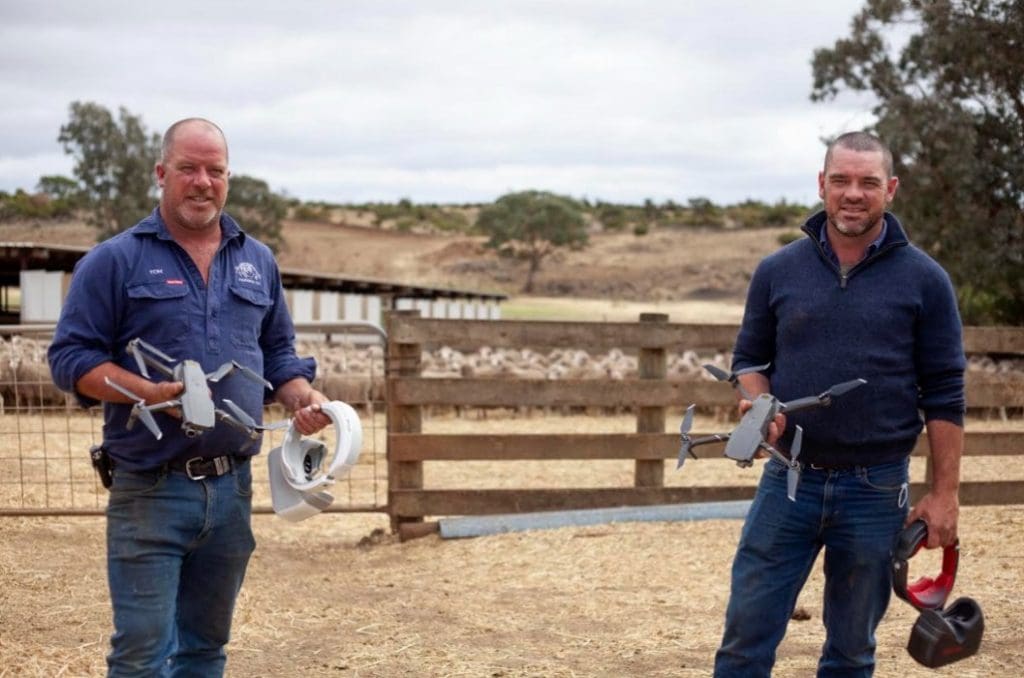VICTORIAN farmers Tom and Bill Alston use drones to take some of the stress and injury risk out of mustering sheep and cattle on their Beeac property in the state’s south-west.
The use of drones on-farm to muster stock, instead of using horses or motorbikes, has reduced the time spent mustering sheep from one day to only a few hours.
Consistent with recent research that has proven drones as a low-stress form of mustering stock, Tom Alston said it is obvious that sheep are less stressed when mustered with drones.
“It’s obvious they area, it’s a brilliant way to do it.
“You can let the sheep go at their own pace, and go where they want to, especially on our farm, with its really rocky undulating country,” he said.
“If you are pushing them (with dogs and motorbikes) you are pushing them the way you want to push them.”
He said the drone allowed the operator to check a lot of country very quickly and safely – at 70 kilometres per hour – and the sheep arrived at the yards more relaxed.
“They’re not buggered.
“It’s a heaps better way to do it.”
The third generation farmers run a cattle and Merino wool operation on 6500 acres near Beeac and they feature in the latest WorkSafe on-farm safety campaign targeting the ‘bulletproof’ attitudes among farmers.

Beeac farmers Tom and Bill Alston are putting sheep in the yard safely with drones.
Twenty-four people have died in Victorian farm workplaces over the past three years. Accidents happen on Victorian farms every day. On average, one in four of those injured on farms take longer than six months to return to work
In 2008 Tom suffered a serious injury using a motorbike on farm while wearing a helmet but without wearing the proper protective gear. Tom lost a lot of skin and spent three months going in and out of hospital to re-apply bandages.
During this time Tom’s family felt the impact of the incident, with father Jim needing to step up and pick up the work that Tom wasn’t able to complete. Tom and Bill are now big proponents of using technology to make their farm safer and more efficient. Tom Alston said farm safety is “number one” since the accident.
The brothers were early adopters in the use of drones for sheep mustering, meaning that they no longer have to use horses or motorbikes for the task. Not only do the drones mean that Tom and Bill are safer, but the half to full day that would have been spent mustering on a motorbike or horse can now be completed in a matter of hours.
“It’s a much more efficient way of doing it and a lot safer.
“If you crash your drone well you just get another drone, whereas if I fall off a horse then who knows what will happen,” he said.
“I think there is a bad culture in farming that my father did it that way, my father’s father did it that way, so just the way it should be done.
“I think that needs to change a fair bit because a lot farming practices can be done a lot safer and in a lot better way.”
WorkSafe inspector Glenn Woods said there can be hesitation from farmers to open their gate to WorkSafe out of fear an inspector will give them a hard time and cost money.
“The fact is, we’re here to help and make a difference.
“Our first focus is always education, chatting about farming and how doing things safer can be efficient,” he said.
“A big thing for us is to ensure you, your workers and your family return home safe at the end of the day.”
The six-week advertising campaign launches this week across regional television, print, radio, digital and social media channels. It highlights that deaths and life-changing injuries on-farm can happen to anyone who doesn’t prioritise safety.
The campaign’s key message – “It’s never you, until it is” – aims to challenge a common mindset among farmers and agriculture workers that a serious incident won’t happen to them.
Emotional story telling targets owner-operator farmers, their workers and families, to bring home the cost of not taking a safety-first approach.
Agriculture remains one of the state’s most dangerous industries, with 24 people dying as a result of on-farm workplace incidents in the past three years.
Last year alone, 424 people working in agriculture, or about eight people every week, were injured seriously enough to make a worker’s compensation claim.
WorkSafe executive director of health and safety Julie Nielsen said the campaign would show that experience alone does not prevent workplace incidents on farms.
“Farmers know their land and machinery like the back of their hand, but that doesn’t make you bulletproof.
“It might be easy to think that a tragic incident will never happen on your farm, but if safety is not your top priority then the chances are high that it will,” she said.
“Farmers owe it to themselves, their families, their workers and communities to always keep safety front of mind and make it a permanent part of their daily life.”
The campaign is part of a wider push to shift attitudes around farm safety under WorkSafe’s Agriculture Strategy 2020-23.
The strategy sets out how WorkSafe will engage with industry to drive cultural change and encourage a mindset that farm workplace deaths and injuries are preventable, not inevitable.
It focuses on high-risk hazards such as machinery, livestock and chemicals and will collaborate with industry to improve the safety of vulnerable employees, including migrant and seasonal workers.
The strategic approach also includes collaborative education programs, new guidance and targeted compliance and enforcement activities.



HAVE YOUR SAY